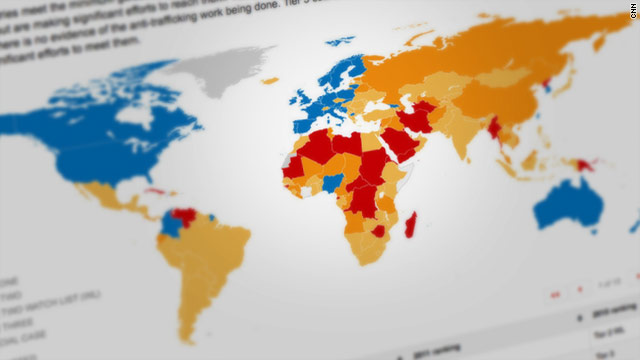A U.S. Government anti-slavery report published Monday throws the spotlight on countries it says are not meeting minimum anti-trafficking standards.
The U.S. State Department's Trafficking In Persons (TIP ) Report identifies countries that it says meet minimum standards, countries working towards them and countries that appear to be doing little to stop trafficking.
Each country is put into one of four grades - Tier 1, Tier 2, Two Watch and Tier Three. The United States can impose sanctions on countries in the bottom tier. (See how the countries rank)
This year, the Dominican Republic was the only country to lift itself out of the bottom tier, and the Czech Republic was the only country to slip out of the top-ranked countries.
The TIP Report cited weak prevention efforts for labor trafficking and the lack of formal steps by the Czech government to reduce demand for commercial sex acts.
It said the Dominican Republic got a higher ranking for protecting more victims and making significant efforts to comply with the minimum standards laid down in the U.S. Trafficking Victims Protection Act.
As the report was published, U.S. Secretary of State Hillary Clinton said: "This report is a tool and we are interested in working with countries around the world to get results."
She said one focus will be countries where anti-trafficking laws are on the books but are rarely used to convict the traffickers. (Watch Clinton explain why trafficking is "unforgiveable")
In Africa, Nigeria and Mauritius kept their Tier 1 status - the only African nations in the top rank - while Algeria, Central African Republic, Equatorial Guinea, Guinea-Bissau, Libya, and Madagascar all dropped into Tier 3
In Asia, China stays on the Two Watch list while India moves off the Watch list and into Tier 2. The report credited India for law enforcement efforts but expressed concern over reports that corrupt officers facilitate sex trafficking.
CNN is seeking reaction of countries singled out for criticism. (See inside the TIP war room)
The report is compiled with the help of U.S. embassies, non-governmental organizations, aid groups and individuals who have submitted data or their own personal accounts.
It counts known cases of human trafficking in more than 175 countries, whether for commercial sex, bonded labor, child labor, involuntary domestic servitude or child soldiers.
And it tracks new legislation, prosecutions and convictions. (See how the report is compiled using 2010 figures)
Tier 1 countries meet the minimum standards laid down in the TVPA but it does not also mean the country does not have trafficking issues or that it cannot improve beyond the minimum.
Tier 2 countries don't fully comply with the minimum standards but are often seen as making significant progress.
Tier 2 Watch countries have fallen short of the legislation's minimum standards despite making "significant efforts." It includes countries with high numbers of victims of severe forms of human trafficking.
Tier 3 countries do not appear to be trying to reach the minimum standard - and they could face limited U.S. sanctions.
The report also honors as heroes 10 people around the world who are trying to stamp out human trafficking.
They include Amela Efendic, who works with trafficking victims in Bosnia-Herzegovina; Charimaya Tamang, a former sex slave who now runs an anti-trafficking organization in Nepal; and Dilcya Garcia, who has pioneered human trafficking prosecutions in Mexico.
Original article from CNN.
Tuesday, June 28, 2011
Monday, January 3, 2011
Former Human Trafficking Victim Granted Clemency
A woman who was 16 when she ambushed and killed her former pimp in a Southern California motel room has been granted clemency by Governor Arnold Schwarzenegger in his last full day in office.
Sara Kruzan, now 32, was sentenced to life in prison without possibility of parole for the 1994 shooting death of George Gilbert Howard.
Prosecutors said Kruzan was no longer working for Howard when she killed him.
Calling her life sentence "excessive", Mr Schwarzenegger commuted Kruzan's sentence to 25 years to life in prison with the possibility of parole.
Her clemency petition cited years of abuse and psychiatric reports saying she suffered from battered women's syndrome.
Mr Schwarzenegger also commuted the manslaughter sentence of Esteban Nunez, the son of former Assembly Speaker Fabian Nunez.
Saying that he thought the 16-year prison sentence Esteban Nunez was serving was "excessive" the governor reduced his sentence from 16 years to seven years.
Nunez pleaded guilty to voluntary manslaughter and assault with a deadly weapon for his role in a fight that killed a 22-year-old man near San Diego State University in 2008.
Prosecutors said Nunez and friends went looking for a fight after they were refused entry to a fraternity party.
Original Article from: Copyright © 2011 The Press Association. All rights reserved.
Sara Kruzan, now 32, was sentenced to life in prison without possibility of parole for the 1994 shooting death of George Gilbert Howard.
Prosecutors said Kruzan was no longer working for Howard when she killed him.
Calling her life sentence "excessive", Mr Schwarzenegger commuted Kruzan's sentence to 25 years to life in prison with the possibility of parole.
Her clemency petition cited years of abuse and psychiatric reports saying she suffered from battered women's syndrome.
Mr Schwarzenegger also commuted the manslaughter sentence of Esteban Nunez, the son of former Assembly Speaker Fabian Nunez.
Saying that he thought the 16-year prison sentence Esteban Nunez was serving was "excessive" the governor reduced his sentence from 16 years to seven years.
Nunez pleaded guilty to voluntary manslaughter and assault with a deadly weapon for his role in a fight that killed a 22-year-old man near San Diego State University in 2008.
Prosecutors said Nunez and friends went looking for a fight after they were refused entry to a fraternity party.
Original Article from: Copyright © 2011 The Press Association. All rights reserved.
Subscribe to:
Posts (Atom)






